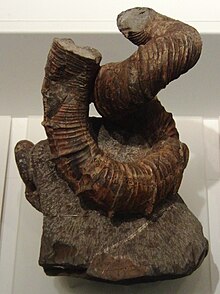| Eubostrychoceras Temporal range: 91.9–72.1 Ma PreꞒ Ꞓ O S D C P T J K Pg N Turonian-Campanian | |
|---|---|

| |
| Fossil of Eubostrychoceras japonicum from Japan. Late Cretaceous. Exhibit in the National Museum of Nature and Science, Tokyo, Japan. | |
| Scientific classification | |
| Domain: | Eukaryota |
| Kingdom: | Animalia |
| Phylum: | Mollusca |
| Class: | Cephalopoda |
| Subclass: | †Ammonoidea |
| Order: | †Ammonitida |
| Suborder: | †Ancyloceratina |
| Family: | †Nostoceratidae |
| Genus: | †Eubostrychoceras Matsumoto, 1967 |
| Species | |
| |
| Synonyms | |
| |
Eubostrychoceras is a genus of helically wound, corkscrew form, heteromorph ammonite which lived during the Upper Cretaceous (M Turonian - Campanian). The genus is included in the ancycleratid family Nostoceratidae.
The shell of Eubostrychoceras is a loosely to tightly wound spiral forming a corkscrew with an open, empty umbilicus in the middle. Coiling is commonly dextral (right hand). Coils are covered by moderately strong, straight transverse ribs. The aperture, or apertural end, reverses general direction and points upwards or back towards to apex. Sutures are moderately complex. The siphuncle is located mid flank.
Eubostrychoceras has a widespread distribution in the Upper Createous and has been found in Antarctica, Japan, Spain, the far east of Russia, Alaska, Vancouver Island, U.S. Western Interior Seaway, Germany, and Madagascar. In 2001 it was reported from Alaska's Matanuska Formation as well. E. japonicum is Turonian, and likely confined to the middle Turonian. Based on the similarity of textures and the curl of the shell as well as the stratigraphic relationships, E. valdelaxum from Japan is likely evolved from E. japonicum.
Related genera include Anaklinoceras, Bostrychoceras, Didymoceras, and Nostoceras.
References
- ^ Sepkoski, Jack (2002). "Sepkoski's Online Genus Database". Retrieved 2023-12-15.
- ^ Anne D. Pasch & Kevin C. May (2001). "Taphonomy and paleoenvironment of hadrosaur (Dinosauria) from the Matanuska Formation (Turonian) in South-Central Alaska". In Darren H. Tanke; Kenneth Carpenter & Michael William Skrepnick (eds.). Mesozoic Vertebrate Life. Indiana University Press. pp. 219–236. ISBN 978-0-253-33907-2.
- "Paleobiology Database - Eubostrychoceras". Retrieved 17 December 2021.
- ^ Daisuke Aiba (July 2017). "A New Species of Eubostrychoceras (Ammonoidea, Nostoceratidae) from the Lower Campanian in the Northwestern Pacific Realm". Paleontological Research. 21 (3): 255-264. doi:10.2517/2016PR028.
Further reading
- The upper Cretaceous ammonite Eubosrychoceras Matsumoto in the western interior of the United States by Willian A Cobban. U.S. Geological Survey bulletin—1690-A, Pub 1987. (Description and illustrations of an unusual ammonite from Wyoming, South Dakota, and New Mexico)
- A New Species of the Heteromorph ammonite Eubostrychoceras from the Upper Cretaceous Frontier Formation, Natrona County, Wyoming.
External links
- "Nostoceratidae HYATT 1894". Amonites (in French). Archived from the original on December 7, 2021.
![]() Media related to Eubostrychoceras at Wikimedia Commons
Media related to Eubostrychoceras at Wikimedia Commons
| Taxon identifiers | |
|---|---|
| Eubostrychoceras | |
This Ammonitida-related article is a stub. You can help Misplaced Pages by expanding it. |
- Ammonitida genera
- Fossil taxa described in 1967
- Nostoceratidae
- Late Cretaceous ammonites of Europe
- Late Cretaceous ammonites of North America
- Ammonites of Asia
- Ammonites of Antarctica
- Fossils of Spain
- Fossils of the United States
- Fossils of Japan
- Fossils of France
- Fossils of Canada
- Fossils of Russia
- Fossils of Germany
- Fossils of Antarctica
- Fossils of Madagascar
- Ammonitida stubs